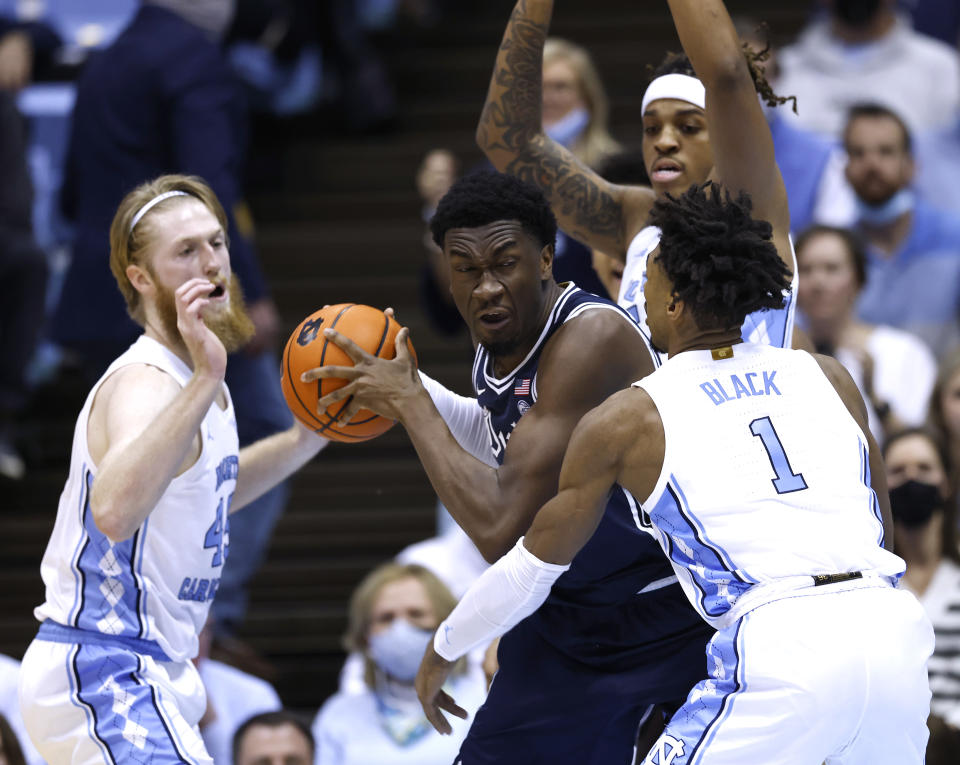One is a beloved, bearded sharpshooter who was once teammates with Trae Young. Another is a future NBA lottery pick from the underrated hoops hotbed of Seattle. A third is the ultimate baby-faced assassin, a point guard who becomes only more lethal when the game is at stake.
All three have one thing in common: They’re starters at this year’s men’s Final Four.
With the Final Four tipping off Saturday, here’s a list of starters on each team ranked 1 to 20 from most to least valuable:
Hailed as a future top-three pick in the NBA draft entering the season, Banchero has lived up to the hype. How many 6-foot-10, 250-pound dudes can be the fulcrum of a multifaceted offense, shooting from deep, creating his own shot off the dribble, and displaying the vision and passing of an elite point guard?
Already a success story before this season, Agbaji has taken another substantial leap. The one-time mid-major recruit is averaging 18.9 points per game and has scored in double figures in all but two of Kansas’ games, elevating himself from impact player to All-American, from fringe NBA prospect to likely first-round pick.
A reminder that, as brilliant as Caleb Love was in the second half against UCLA, North Carolina doesn’t survive that game without this hustle play from Bacot:
The hulking big man has also done plenty that has shown up on the scoreboard. He’s had a double-double in all four of North Carolina’s NCAA tournament games, including 22 and 20 against overmatched Saint Peter’s.
In a year when even some of college basketball’s top programs have experienced shaky point guard play, Villanova has no such concerns. The always dependable Gillespie sets the tone on defense for Villanova, and he’s a lethal scorer and playmaker out of the high pick-and-roll or the low post.
What a luxury for Duke’s perimeter defenders having Williams as the last line of defense to protect the rim. Williams was especially good against Arkansas in the West regional final, making all six of his shots, bringing constant energy on the glass and altering numerous shots around the basket.
Brady Manek is the lethal spot-up shooter and pick-and-pop specialist he was hailed to be when he transferred from Oklahoma. He’s so much more than that too. He can pass, cut, rebound, defend and score around the rim. All you have to do is watch North Carolina’s final 10 minutes without him against Baylor to see how important he is to the Tar Heels.


“Big Game Jermaine,” as he is now known, has saved his finest performances for the NCAA tournament stage. In addition to his usual effort holding his own against bigger, stronger post players in the paint and switching into smaller guards on the perimeter, Samuels is averaging 17.5 points and 8.5 rebounds the past four games.
On a youthful Duke team with three freshmen and two sophomores among its top six players, a 20-year-old junior has become the Blue Devils’ emotional leader. The do-it-all Moore is also an improved floor spacer and a versatile defender.
9. Caleb Love, G, North Carolina
Turns out the streak-shooting sophomore guard has a quick trigger on both the court and the keyboard.
Griffin has been an elite floor spacer at Duke, shooting an impressive 45.8% from behind the arc. When defenders make the mistake of helping off Griffin, he consistently floats to space and makes them pay, either by burying an open jump shot or attacking a late closeout.
Since the Kentucky loss, after which Kansas’ defense was criticized, the Jayhawks have been fourth nationally in adjusted defensive efficiency, per Bart Torvik.
12. RJ Davis, G, North Carolina
Davis has shown the ability to be a setup man in this tournament or to call his own number. The sophomore followed up a 12-assist performance in the opening round against Marquette by dropping 30 points on Baylor.
Duke is a different team with Roach playing confidently at point guard, punishing pick-and-roll switches and hitting tough shots at key moments. He is playing his best basketball in March and remains a key player for Duke this weekend.
The biggest improvement that Wilson has made between his freshman and sophomore seasons is his efficiency. The 6-foot-8 sophomore has double-doubles in Kansas’ two closest NCAA tournament games and leads his team in rebounding.
Watch for Dixon to become an even bigger offensive focal point for Villanova now that Justin Moore is sidelined. Not only are the Wildcats 14-3 this season when Dixon scores in double figures, the 6-foot-8 forward has thrived relying on his mobility and toughness against bigger centers like David McCormack.
The moment you knew on Sunday that Kansas was not going to lose.
In his return to his hometown of New Orleans, Daniels will be asked to fill big shoes. The former Tulane transfer will enter Villanova’s starting five in place of Moore, the Wildcats’ second leading scorer who ruptured his Achilles tendon late in the victory over Houston last Saturday.
18. Leaky Black, G, North Carolina
North Carolina doesn’t care that Black scored only a total of 15 points in four NCAA tournament games. The long-armed 6-foot-8 guard is in the Tar Heels’ starting five because of his lock-down perimeter defense.
Whereas Jermaine Samuels has shouldered a bigger load on offense this month for Villanova, Slater has faded into the background. Villanova needs him to be more assertive with Moore out and Kansas’ defensive attention likely to fall on Gillespie and Samuels.
Harris may be the starter — hence his ranking on this list — but sixth man Remy Martin is Kansas’ more impactful player. Whereas Harris is a pass-first facilitator, Martin is a high-scoring spark plug whose line-drive jumpers and twisting layups have been falling this postseason.
